Social: #GeoWeek #ThatsGeography
Twitter: @InsideNatGeo @NatGeoEducation @NatGeo
Facebook: @InsideNatGeo
Instagram: @insidenatgeo
Website: https://www.nationalgeographic.org/education/programs/geography-awareness-week/
Too many young Americans are unable to make effective decisions, understand geo-spatial issues, or even recognize their impacts as global citizens. National Geographic created Geography Awareness Week to raise awareness to this dangerous deficiency in American education and excite people about geography as both a discipline and as a part of everyday life.
Each year more than 100,000 Americans actively participate in Geography Awareness Week. Established by presidential proclamation more than 25 years ago, this annual public awareness program encourages citizens young and old to think and learn about the significance of place and how we affect and are affected by it. Each third week of November, students, families and community members focus on the importance of geography by hosting events; using lessons, games, and challenges in the classroom; and often meeting with policymakers and business leaders. Geography Awareness Week is supported by access to materials and resources for teachers, parents, community activists, and all geographically minded global citizens.
What is geography?
Geography is the study of places and the relationships between people and their environments. Geographers explore both the physical properties of Earth’s surface and the human societies spread across it. They also examine how human culture interacts with the natural environment and the way locations and places can have an impact on people. Geography seeks to understand where things are found, why they are there, and how they develop and change over time.
Who is involved in Geography Awareness Week?
Geography Awareness Week is celebrated by students, educators, families, schools, nonprofit organizations, businesses, and policymakers around the world.
Where does GIS fit in?
Geographic Information Systems (GIS) are important tools that have the potential to greatly improve the population’s geo-literacy. Its spatial focus embraces the idea of interconnectedness, and it can be used to solve many of the problems Geography Awareness Week addresses. That is why GIS Day was incorporated into Geography Awareness Week in 1999 and has taken place every Wednesday of the week since. For more information, go to GISday.org.
How does Geography Awareness Week help?
Unfortunately, geography is neither widely taught nor well-taught in our schools today. Social sciences as a whole have been de-emphasized in schools in the last decade. Within the subject of geography, there is a disproportionate focus on dates, events and individuals, while little to no attention is paid to the functioning of human-environment systems or geographic reasoning. In fact, the United States lags behind the rest of the world in both the quality and quantity of every aspect of geography education.
Geography Awareness Week hopes to not only raise awareness of this deficiency and attempt to reverse the trend in schools but to provide materials to support better geography education in the United States. National Geographic works with teachers and other content experts to develop activities for the classroom, home or community. The activities include games, lessons and experiential projects. Guides and educational materials for these activities are available for free here.
Geography Awareness Week is also an opportunity to bring attention to the need for educational policies that will increase geographic literacy. Over the years, we have used Geography Awareness Week to mount campaigns for state standards in geography and federal funding for teacher education. Geography Awareness Week materials encourage people to become educated about ways they can advocate for improved geographic education in their communities.

